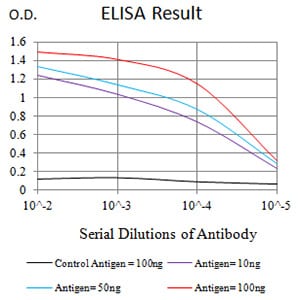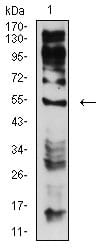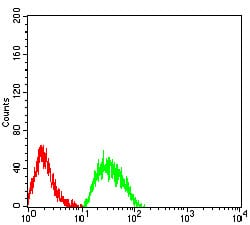


| WB | 1/500 - 1/2000 | Human,Mouse,Rat |
| IF | 咨询技术 | Human,Mouse,Rat |
| IHC | 咨询技术 | Human,Mouse,Rat |
| ICC | 技术咨询 | Human,Mouse,Rat |
| FCM | 1/200 - 1/400 | Human,Mouse,Rat |
| Elisa | 1/10000 | Human,Mouse,Rat |
| Aliases | ACHRE; CMS1D; CMS1E; CMS2A; CMS4A; CMS4B; CMS4C; FCCMS; SCCMS |
| Entrez GeneID | 1145 |
| clone | 5F11G8 |
| WB Predicted band size | 54.7kDa |
| Host/Isotype | Mouse IgG1 |
| Antibody Type | Primary antibody |
| Storage | Store at 4°C short term. Aliquot and store at -20°C long term. Avoid freeze/thaw cycles. |
| Species Reactivity | Human,Rat |
| Immunogen | Purified recombinant fragment of human CHRNE (AA: extra 21-239) expressed in E. Coli. |
| Formulation | Purified antibody in PBS with 0.05% sodium azide |
+ +
以下是3篇关于CHRNE抗体的参考文献及其摘要概述:
1. **"Autoantibodies to the epsilon Subunit of the Acetylcholine Receptor in Seronegative Myasthenia Gravis"**
*By Rodriguez Cruz PM, Al-Hajjar M, Huda S, et al. (2019)*
摘要:首次报道在血清阴性重症肌无力(MG)患者中发现针对AChR ε亚基(CHRNE)的自身抗体,揭示其可能通过干扰神经肌肉接头信号传导导致肌无力症状,拓展了MG的抗体检测范围。
2. **"Pathogenic Autoantibodies in the Serum of Congenital Myasthenic Syndrome Patients Target the Epsilon Subunit of the Acetylcholine Receptor"**
*By Cossins J, Belaya K, Liu WW, et al. (2012)*
摘要:研究发现部分先天性肌无力综合征(CMS)患者血清中存在抗CHRNE的自身抗体,这些抗体通过阻断AChR功能或增加其内吞作用,导致突触传递障碍,提示自身免疫机制可能参与某些CMS亚型。
3. **"Experimental Autoimmune Myasthenia Gravis Induced by Immunization with CHRNE Peptides in Mice"**
*By Luo J, Lindstrom J. (2017)*
摘要:在小鼠模型中,通过免疫CHRNE特异性多肽成功诱导出实验性自身免疫性重症肌无力(EAMG),证实抗CHRNE抗体可直接破坏神经肌肉接头处AChR ε亚基的稳定性,为研究CHRNE抗体病理机制提供模型。
---
**备注**:CHRNE相关抗体研究较少,主要集中于罕见自身免疫病例或实验模型。多数文献仍聚焦于CHRNE基因突变导致的先天性肌无力综合征(CMS)。如需抗AChR抗体在经典重症肌无力中的研究,建议补充α亚基(CHRNA1)相关文献。
The CHRNE antibody targets the epsilon subunit of the nicotinic acetylcholine receptor (AChR), a critical protein at the neuromuscular junction (NMJ) responsible for transmitting signals between motor neurons and skeletal muscles. This receptor is composed of five subunits (α2βδε in adults), with the ε subunit (encoded by the CHRNE gene) playing a key role in maintaining receptor stability and ion channel function. Antibodies against CHRNE are primarily associated with autoimmune disorders, particularly a rare subset of myasthenia gravis (MG), an autoimmune condition characterized by muscle weakness and fatigue. Unlike the more common anti-AChR antibodies targeting the α subunit, CHRNE-specific antibodies are less frequent and often linked to specific clinical phenotypes, such as asymmetric ocular weakness or mild generalized MG.
CHRNE antibodies disrupt neuromuscular transmission by blocking AChR function, accelerating receptor degradation, or activating complement-mediated damage. Their presence can aid in diagnosing seronegative MG cases (negative for conventional AChR antibodies) and guide personalized treatment strategies, including immunosuppressive therapies or thymectomy. Additionally, CHRNE mutations (not antibodies) are implicated in congenital myasthenic syndromes (CMS), hereditary disorders affecting NMJ function. Distinguishing autoimmune CHRNE antibody-mediated MG from CMS requires clinical evaluation, antibody testing, and genetic analysis. Research continues to explore the antibody’s pathogenicity and its role in broader autoimmune contexts.
×